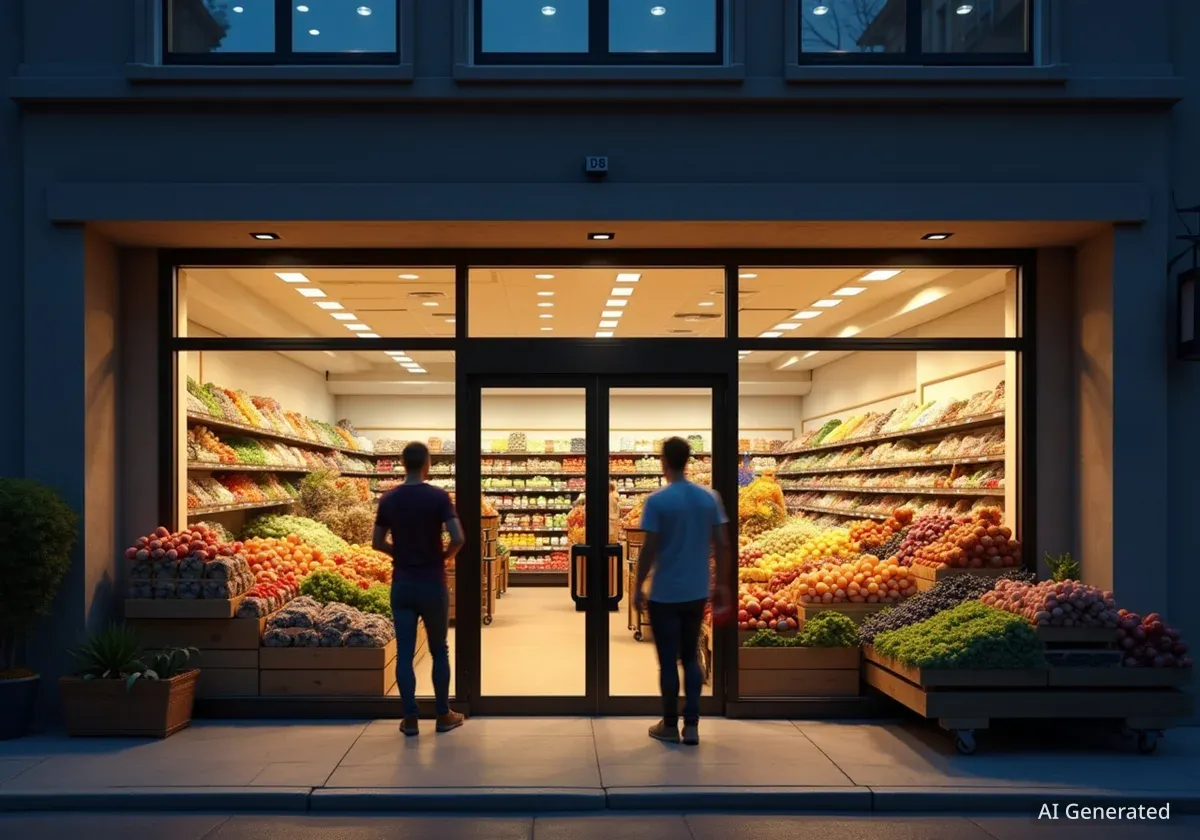The Anuga 2025 food and beverage trade fair showcased a wide range of industry innovations, with a strong focus on alternative proteins, sustainability, and health-conscious products. Companies from around the world presented new solutions, from mycelium-based meat alternatives and hybrid cheeses to organic canned goods, highlighting the sector's response to evolving consumer demands and environmental concerns.
Alongside terrestrial food advancements, insights from space exploration are also shaping the future of nutrition. European Space Agency astronaut Rosemary Coogan discussed the critical challenges of feeding crews on long-duration missions, emphasizing how technologies developed for space could offer sustainable solutions for food systems on Earth.
Key Takeaways
- Anuga 2025 revealed a diversifying alternative protein market, featuring plant-based, mycelium, and hybrid dairy-plant products.
- Sustainability and clean-label ingredients are primary drivers of innovation, with companies focusing on organic sourcing and reduced emissions.
- Health and wellness trends are influencing product development, from functional beverages to better-for-you bakery items.
- Insights from space food research, such as water recycling and cellular agriculture, show potential for improving food security on Earth.
The Shifting Landscape of Alternative Proteins
The alternative protein sector, a major focus at Anuga 2025, is moving beyond simple plant-based burgers. Companies are now exploring more complex and innovative approaches to create products that are both sustainable and appealing to consumers. This evolution is splitting the market into several distinct categories: vegetable-forward basics, high-tech meat analogs, and hybrid products that blend traditional and alternative ingredients.
Mycelium as a Clean-Label Solution
Danish startup Matr presented a notable innovation using mycelium, the root structure of fungi. The company uses open solid-state fermentation to create a plant-based protein product that is free of additives. This clean-label approach addresses growing consumer skepticism toward highly processed foods.
Matr's product is made from just five organic ingredients sourced in Denmark: beets, oats, potatoes, lupins, and split peas. The mycelium acts as a natural binder, eliminating the need for methylcellulose or other common additives found in many meat alternatives. This method results in a product that is both minimally processed and rooted in local agriculture.
Hybrid Products Bridge the Gap
AB Technologies introduced a new brand, From Up, featuring a hybrid cheese designed for the ready-meal market. This product aims to offer a more sustainable option without completely removing dairy. It contains 60% traditional dairy cheese, combined with potato ingredients and grapeseed oil.
Hybrid Cheese Composition
The From Up hybrid cheese by AB Technologies is formulated with 60% dairy cheese. The remaining 40% includes potato and grapeseed oil, which the company states contributes to a lower emissions profile and adds health benefits.
Alexandre de Ferrier, a sales manager at AB Technologies, explained that this approach helps reduce the carbon footprint associated with dairy production while maintaining the familiar taste and texture that consumers expect from cheese. The inclusion of grapeseed oil is also marketed as a source of additional health benefits.
Sustainability and Health as Core Drivers
Across the event, a clear theme was the industry's push toward greater sustainability and products that cater to health-conscious consumers. This trend was visible in everything from canned goods to bakery items, with an emphasis on organic ingredients and transparent supply chains.
Organic and Premium Canned Goods
The Spanish company El Navarrico showcased its line of organic canned products, targeting high-end business-to-business customers globally. Their range includes vegetables, pulses, and broths, all sourced from organically-grown produce. Paz Salcedo López, the company's purchasing manager, highlighted the growing demand for premium, convenient, and healthy pantry staples.
By focusing on organic certification, the company appeals to consumers who prioritize environmental stewardship and natural ingredients in their food choices. This strategy positions their traditional canned products within the modern wellness market.
Bakery Trends Focus on Wellness and Visual Appeal
Lantmännen Unibake demonstrated that health trends are also reshaping the bakery sector. The company is innovating in the healthy on-the-go bakery segment, creating products that are both nutritious and visually appealing. According to Jeroen Demuydt, the company is using natural colors and creating branding opportunities on bread to capture consumer attention.
"Healthy bakery on-the-go is a top trend driving innovation for us. We are creating breads with a 'wow' factor by using natural colors and enabling branding opportunities directly on the product."
This approach combines the demand for convenience and health with the need for products to stand out in a crowded marketplace, showing that even staple foods are being reimagined for today's consumer.
The Role of Certification in Sustainability
Ensuring that sustainability claims are credible is a significant challenge for the food and beverage industry. Annelies van Oosterom, business development manager at the certification company Kiwa, spoke about the importance of compliance. She explained that integrated certification and local expertise can help businesses navigate evolving regulations and meet consumer expectations for transparency.
As sustainability becomes a key purchasing factor, third-party verification helps build trust and provides companies with a competitive edge. According to van Oosterom, robust certification processes are essential for turning sustainability goals into verifiable achievements.
Global Flavors Reach New Markets
The event also highlighted the increasing globalization of food trends. South Korean food manufacturer Daesang presented its global brands, O’food and Jongga, with a clear strategy to expand its presence in Europe. Grace Eunhae Kim, marketing team leader, discussed the company's plans to introduce its sauces and popular kimchi products to a wider audience.
This expansion reflects a growing Western appetite for international cuisines, particularly those with perceived health benefits like fermented foods. Daesang's strategy involves leveraging the popularity of Korean culture to create new growth opportunities in the European market.
Food Innovation Inspired by Space Exploration
Beyond the trade show floor, discussions about the future of food extended to the challenges of long-duration space missions. European Space Agency (ESA) astronaut Rosemary Coogan provided a unique perspective on food technology, explaining the difficulties of providing nutritious and palatable food for astronauts.
The Challenge of Space Nutrition
Astronauts on long missions, such as a potential trip to Mars, face significant nutritional challenges. Food must be lightweight, have a long shelf life, and provide complete nutrition to counteract the negative health effects of spaceflight, such as bone and muscle loss. The psychological importance of enjoyable food is also a key consideration.
Coogan highlighted the potential of cell-based and plant-based foods as solutions for producing fresh food in space. These technologies could allow astronauts to cultivate their own food, reducing reliance on pre-packaged meals sent from Earth.
Space Technology for a Sustainable Earth
Crucially, Coogan noted that technologies developed for space could have significant benefits for Earth. The closed-loop systems required for space habitats, such as advanced water recycling, are models for sustainable living in resource-scarce environments on our own planet.
"Space sustainability practices, like water recycling, could directly benefit Earth’s food systems, particularly in extreme environments," Coogan explained. This crossover demonstrates how the push to explore other worlds is driving innovation that can help solve some of Earth's most pressing challenges, including food and water security.



